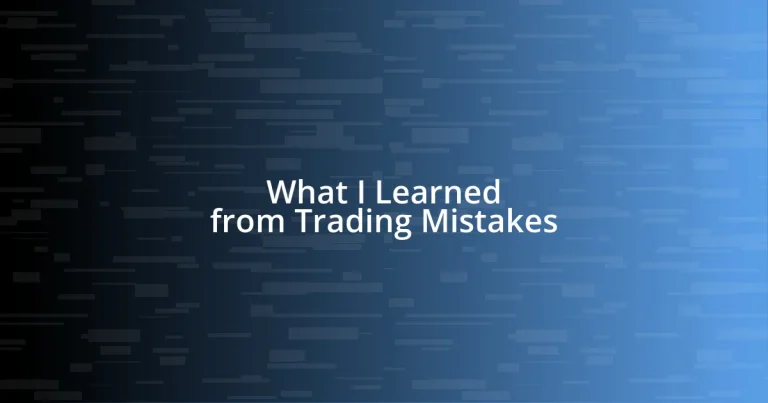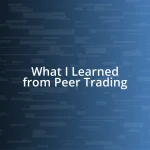Key takeaways:
- Trading mistakes can serve as valuable learning opportunities; reflecting on failures is essential for personal growth and strategy refinement.
- Maintaining a trading journal and categorizing mistakes allows traders to identify patterns and improve decision-making processes.
- Adopting a growth mindset encourages traders to view setbacks as chances for development, fostering resilience and adaptability in their trading strategies.
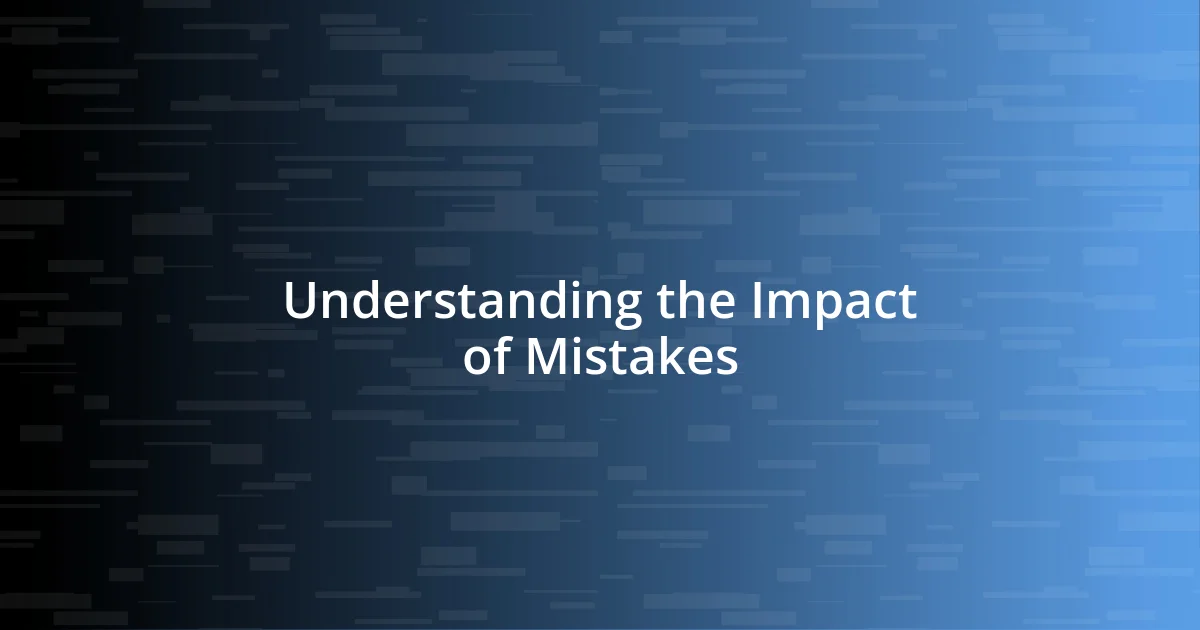
Understanding the Impact of Mistakes
Mistakes in trading may feel like roadblocks, but they can also be powerful teachers. I remember one particularly rough day when I ignored my gut and followed a trend that seemed promising—only to watch my investment plummet. In moments like this, it’s natural to feel frustration, but I realized that each failure provides a chance to reflect and refine my strategy.
There’s an emotional weight attached to our trading mistakes that can linger long after the numbers fade. I’ve felt that sinking feeling in my stomach after a bad trade, wondering where I went wrong. It’s these experiences that really highlight the importance of self-awareness; recognizing the emotional triggers behind poor decisions can prevent future missteps. How can we learn if we do not confront these feelings head-on?
Understanding the impact of mistakes goes beyond mere analysis; it’s about personal growth. I often ask myself why I made a specific decision and what I could have done differently. That inquiry has deepened my understanding of not just the market but also my own mindset. By embracing these learnings, I’ve been able to transform every setback into a stepping stone for future success.
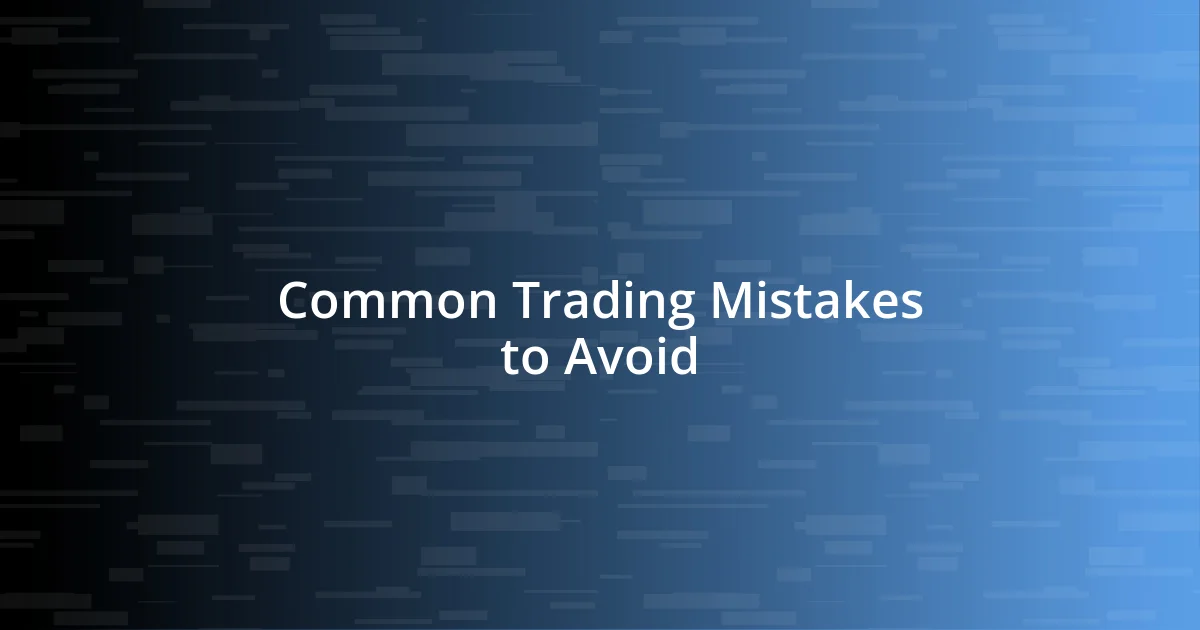
Common Trading Mistakes to Avoid
When I look back at my trading journey, a couple of common pitfalls stand out as particularly damaging. For example, I used to overtrade, buying and selling out of impulse rather than sticking to my well-thought-out strategies. This lack of discipline often led to churning fees and losses that could have been avoided. Each instance taught me the vital lesson: patience pays off.
Here are some mistakes I’ve learned to avoid:
- Neglecting Research: Skipping proper analysis before making a trade can lead to regret. I’ve felt the sting of hastily believed hype.
- Ignoring Stop Losses: Forgetting to set stop losses can turn a small downturn into a significant loss. I once held onto a losing stock, hoping for a rebound that never came.
- Emotional Trading: Letting emotions drive decisions is a slippery slope. I vividly remember chasing losses out of frustration, only to dig a deeper hole.
- Chasing Trends: Jumping on hot trends without due diligence can backfire. I learned this the hard way when I invested in a soaring stock that quickly crashed.
- Lack of a Trading Plan: Trading without a solid strategy is like navigating without a map. I once jumped in and out of trades, only to wonder what my end goal was.
Reflecting on these experiences has been essential in shaping my trading approach today.

How to Analyze Your Mistakes
Analyzing mistakes is like holding a mirror to our trading practices. I recall a time when I lost a substantial part of my portfolio because I neglected to analyze my decision-making process. It struck me how crucial it was to not just look at the outcome, but to dissect the steps I took leading up to that point. By jotting down my thoughts after each trade, I began to recognize patterns in my decision-making that were often clouded by emotion.
Another important aspect is to categorize mistakes. I remember classifying mine into emotional errors, strategic blunders, and technical oversights. This method helped me better understand where I was going wrong. Reflecting on these categories not only spotlighted my weaknesses but also revealed areas where I could improve. By addressing each type of mistake systematically, I felt more empowered and focused on my journey toward becoming a better trader.
Lastly, I found it beneficial to approach my mistakes with a growth mindset. Instead of beating myself up over poor trades, I ask myself questions like, “What can I learn from this?” and “How can I adjust my strategy moving forward?” This shift in perspective has made the process less daunting and even exciting. Analyzing my mistakes has transformed what seemed like failures into meaningful steps toward mastery.
| Type of Mistake | Personal Experience |
|---|---|
| Emotional Errors | I once panicked during a market dip and sold low, deeply regretting it. |
| Strategic Blunders | Ignoring my stop-loss led to losing more than I anticipated during a downturn. |
| Technical Oversights | Failing to double-check my analysis tools caused me to miss critical signals. |
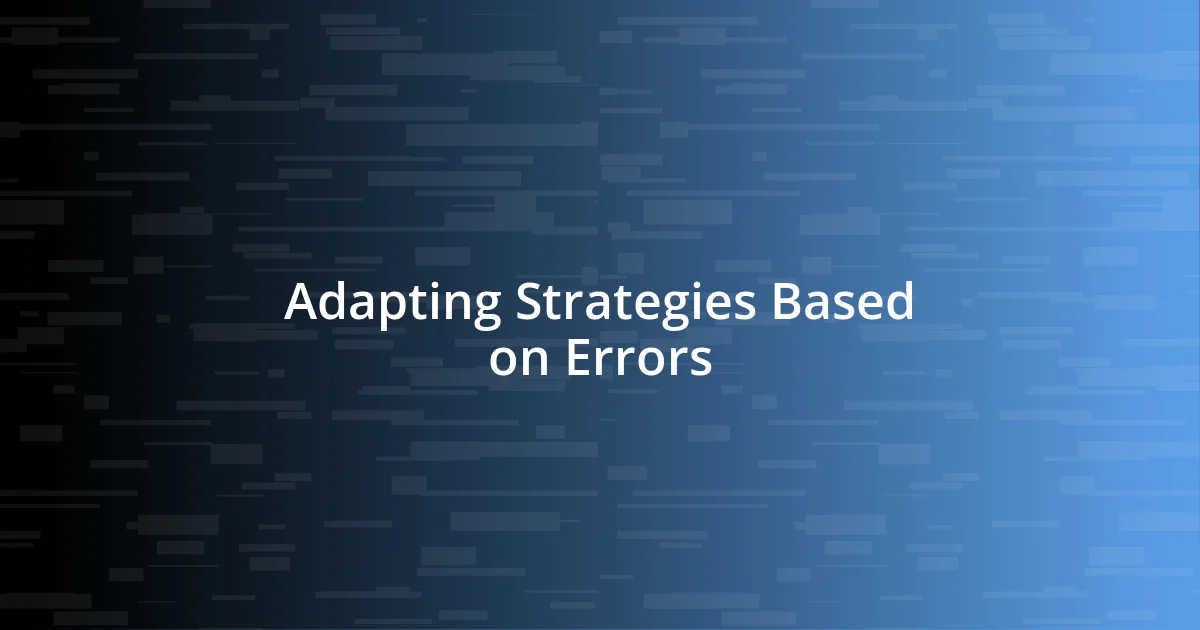
Adapting Strategies Based on Errors
Adapting my trading strategies based on past errors has been a cornerstone of my growth. Once, I realized that my tendency to ignore fundamental analysis was costing me dearly; I lost money because I chased a company stock that was riding a wave of hype but had poor underlying metrics. This experience pushed me to prioritize research over impulse, refining my strategies to focus on solid fundamentals, which ultimately led to more informed trading decisions.
I also vividly remember a time when I let emotional trading cloud my judgment during a volatile market phase. The anxiety of seeing my portfolio dip made me second-guess my initial plans. As soon as I took a step back and assessed my emotional responses, I modified my approach. Now, I incorporate structured breeding intervals of calm reflection, allowing me to recalibrate my strategies during emotionally charged times. This practice has significantly improved my decision-making process.
One key question I often ask myself after a setback is, “What would I do differently if I faced this situation again?” This reflective process has been instrumental when I look at the mistakes I’ve made. For instance, after a failed trade that stemmed from a lack of a clear exit strategy, I set a new rule: always define an exit point beforehand. By adapting my strategy based on lessons learned, I find myself not just reacting to mistakes but evolving as a trader. How has your experience led you to adapt your strategies?
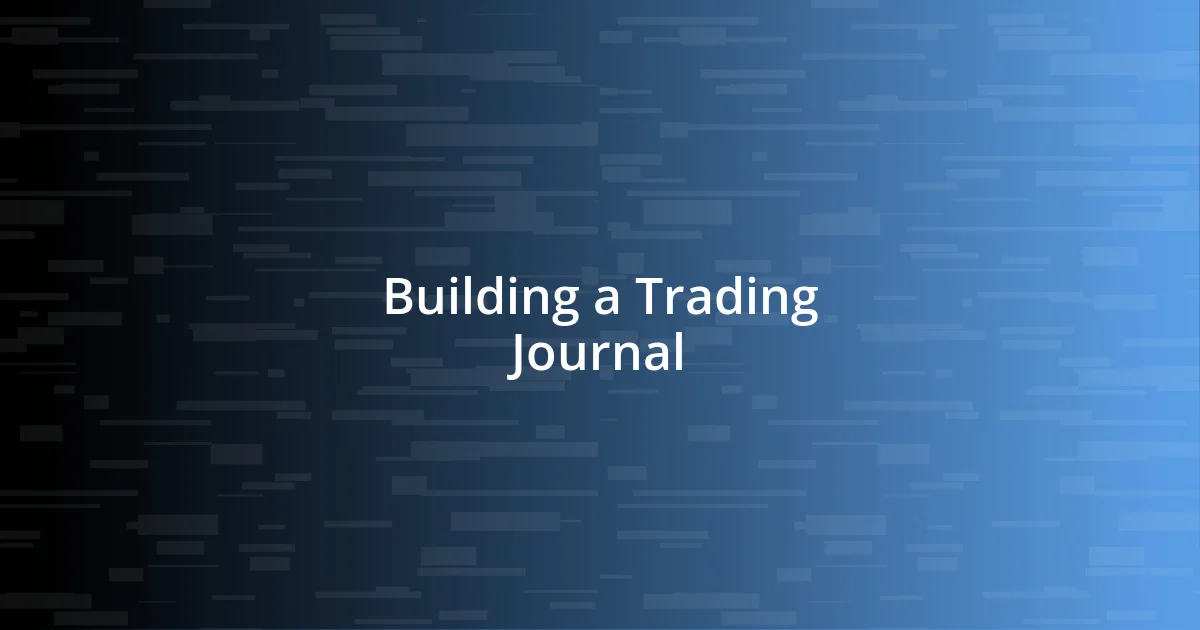
Building a Trading Journal
Keeping a trading journal has been a game changer for me. Initially, I thought it would be just another task, but each entry became a treasure chest of insights. For instance, jotting down the reasons behind my trades alongside the outcomes illuminated how my emotions influenced my decisions. I discovered that on days when I felt particularly stressed, my trades suffered more frequent losses. Isn’t it fascinating how our emotions can sway our financial choices?
When I started categorizing my journal entries, the patterns became clearer. I remember feeling frustrated when I noticed how often my poor trades coincided with a lack of research. I had to ask myself, “Why am I skipping this step?” Those reflections sparked a commitment to never enter a trade without thorough analysis. Now, every time I sit down to reflect, I not only recall those mistakes but also celebrate the milestones when my due diligence paid off.
I find that reviewing my journal regularly helps me keep a pulse on my evolving trading mindset. One evening, while reflecting back on a particularly challenging month, I uncovered a significant learning moment: I had underestimated the value of risk management. A simple addition to my journal, tracking my risk-to-reward ratio, has now become essential for my trading decisions. Have you considered what adding a trading journal could unveil about your approach? It might just lead you to newfound clarity.
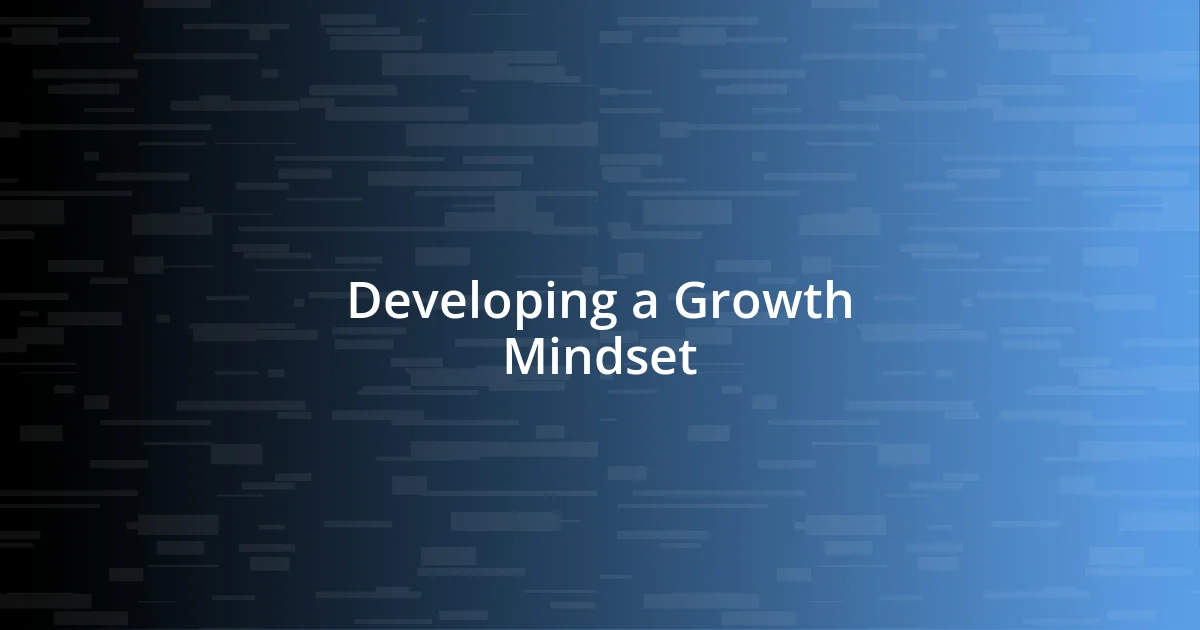
Developing a Growth Mindset
Developing a growth mindset has profoundly reshaped how I view mistakes in trading. I recall a day when I lost a substantial amount due to my stubbornness in sticking with a losing trade. Instead of feeling defeated, I used that experience to foster a mentality centered on learning. I began to embrace failures as stepping stones rather than stumbling blocks. Isn’t it empowering to shift your perspective on setbacks?
There was also a time when I realized that my fear of making mistakes was preventing me from trying new strategies. When I finally decided to venture outside my comfort zone, I felt a rush of excitement paired with anxiety. I vividly remember my first attempt at a trading strategy that I had only read about, which initially led to a loss. Instead of giving up, I dissected what went wrong and adjusted my approach. This moment taught me that the willingness to experiment, even when faced with potential failures, is crucial for growth. Have you ever held back because of fear?
I often ask myself, “How can I turn this experience into a valuable lesson?” This question challenges me to reflect on my trading journey continually. After a particularly disappointing month filled with avoidable losses, I took a hard look at my decision-making process. I realized I wasn’t just trading; I was learning to adapt and evolve. Each mistake became not just a point of frustration but an essential element of my development as a trader. How have your challenges influenced your personal growth in trading?
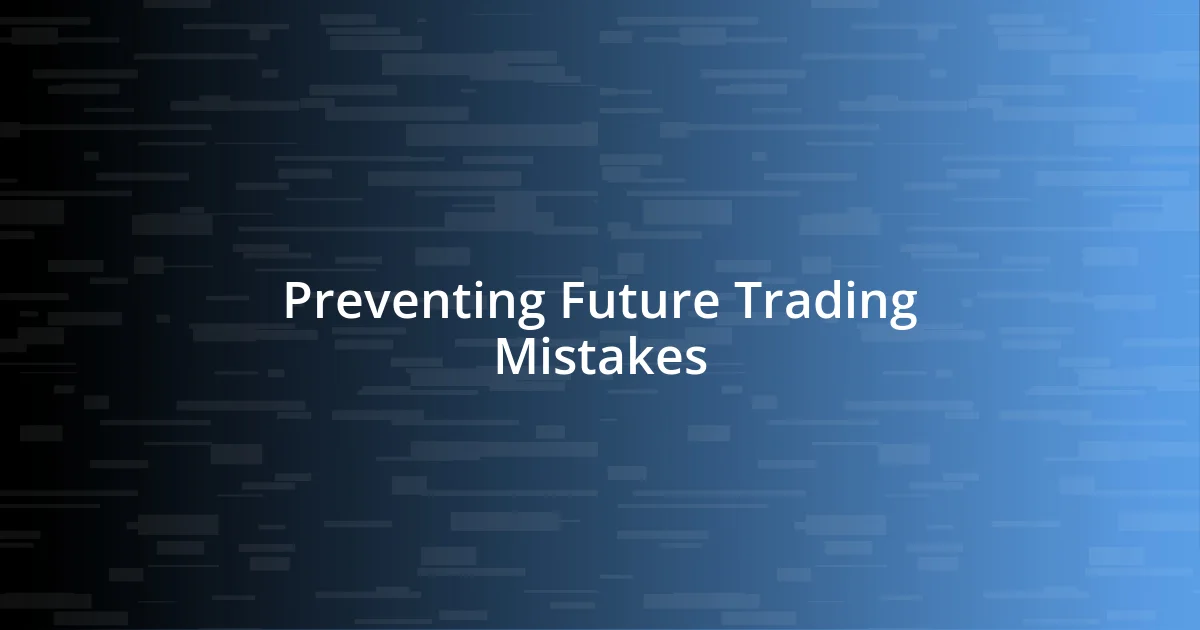
Preventing Future Trading Mistakes
While revisiting my trading strategies, I found that creating a checklist before each trade significantly reduces mistakes. There were times when I skipped certain steps—like verifying market conditions or double-checking my analysis—only to regret it later. Have you ever impulsively jumped into a trade without doing your due diligence? Building a simple checklist has helped me avoid that pitfall, ensuring I cover all bases and make more informed decisions.
Another game-changing practice I’ve adopted is setting specific trading goals and limits. Early in my journey, I often found myself overtrading, driven by a desire to recoup losses. One night, sitting in front of my computer screen with mounting frustration, I realized this habit was counterproductive. Now, before each trading session, I remind myself of my limits and stick to my defined goals. It’s a simple act, but it fosters discipline in my approach. What steps do you take to hold yourself accountable during trades?
I’ve also learned the importance of having a support system of fellow traders. Sharing experiences with others has opened my eyes to new perspectives and strategies I hadn’t considered before. There was a time when I felt isolated in my trading challenges, thinking I was the only one struggling. Engaging with a community not only provides encouragement but also prompts valuable discussions about mistakes and shared learning. Have you tapped into a community that can support your trading journey? You might find that collective insight can be a tremendous asset.












